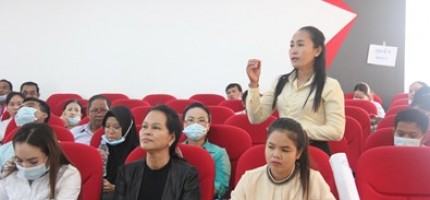SUCCESS & INNOVATION
CHANGING TEACHERS’ BEHAVIORS
Date : 2021-09-15

Vanneam is a teacher at Tuol Thmer secondary school in Kg-Cham Town, Kg-Cham Province. She is a Home Economics teacher in grade 7 and 8 in her school. Usually, she comes to school only one to twice times per week because she thought that her subject is not importance for her students.
When the Life Skill Learning for Adolescent Girls project started the program in this school, project team have worked with school management team for pilot P.A.C.E. curriculum in this school. School director has also selected her to responds on teaching this program. For the first time, she thinks that this life skill program is the same with the school life skill program that has tough every day and she also decided to teach.
The project has provided a 6-days training workshop on book using and teaching method of P.A.C.E. curriculum to all teachers from project target schools and this workshop facilitated by project Master Trainer team. After workshop, she felt that, she wanted to reject this program because it is difficult to understand and complicated then what that she has learnt from school. With the encouraging from school director and project staff, she was started her teaching to her grade 7 students in her the school.
It’s difficulty for her to teach a new curriculum and it’s the new one that she never teaches as well. She faced with a lot of challenges such as: new wording, technical world definition, exploring lesson content and as well as the implementation of other activities that require students to participate. Not only that, she also gets some questions from the students which are sometimes difficult to answer to them. She also often complains about the consequences that she faced during the teaching of this book, she has to spend more than twice the time to reading to understand the content of each lesson in these books, which is usually she reads her main subject only once before going out to teach students.
After she tried to understand the program by reading again and again, including many experiences, she encountered while teaching the students, make her to realize that the program is not as difficult to teach as she thought, and it really importance of acquiring new knowledge for her as well as students.
Although she has to face those problems, but with a clear understanding of the programs and teaching methods, she has a high commitment and hard work to teach students by change herself from coming to school once or twice a week instead of coming to school every day. With the extra encouragement of the project team and the principal, Mrs. Vanneam became an excellent teacher who made the students love her very much and always went to school with her, never absent like before. Not only that, for some students who have personal problems, health problems or family problems, they also come to discuss and ask for good advice from her. She gave various suggestions and encouragement to his female students. "Girls are more scared and vulnerable than boys," she said. " So, we must support girls and educate them to be self-reliant and self-sufficient so that they can become women and role models for their children and the next generation of girls." Not only teaching students and learning more, all the workshops and meetings organized by the project, she always involved and actively participate in group discussions and activities that the facilitator asked to do and she always shares good experiences that she has to other teachers as well.
We can say that, Mrs. Vanneam is one of the most active teachers in the project and also one of the most praised teachers and project staff. All of this is because she perceives that “The P.A.C.E. curriculum is a new program that is important to provide to students and teachers with knowledge about gender, personal skills development, decision making, future planning and social attitudes.
Finally, she also requested the program to continue and expand the activities to other schools across the country to help students and teachers to acquire this new knowledge to develop themselves for the future of them.
117
Preschool(s)
178
Primary Schools
207
High Schools
2
Higher Education Institutions
163,072
Students
4,487
Teachers/Directors
5,362
Stakeholders


